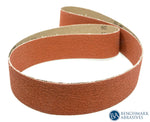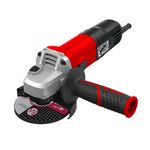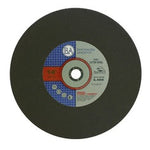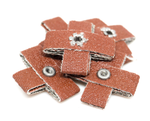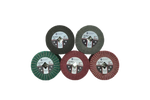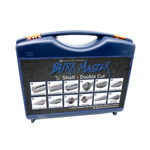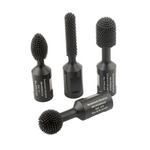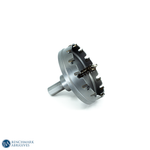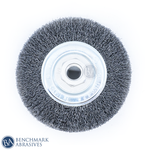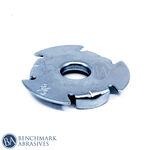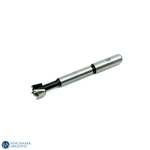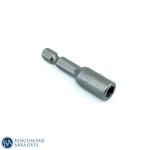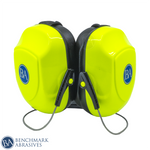
What are Nylon Wire Brushes?

What are Nylon Wire Brushes
The Nylon Wire Brushes are highly durable & solid to enhance the efficiency of the tool. A nylon brush increases life span and reduces the polish timing. It makes hard-to-reach areas and bent or angled surfaces clean and smooth.
The abrasive grains present in the nylon brush filaments enable high quality deburring, blending, and surface finishing.
Types of Nylon Wire Brushes
Abrasive Nylon Wire Brushes are ideal for a wide variety of materials finishing. In the full range of abrasive nylon grit sizes, Spiral Brushes offers Power brushes (wheel brushes, cup brushes, and end brushes), specially built Cylinder brushes and Strip brushes, and Centerless Grinder brushes. For various types of abrasive brushes, common applications include:
- Wheel brushes: Wheel brushes are best to use for deburring, finishing surface, and removal of coating materials without changing the basic geometric shape. Abrasive wheel brushes offer a linear course for brushing.
- Cup brushes: Abrasive cup brush is required to deburring and surface finishing to achieve a variety of surfaces from various directions where the multi-directional brushing.
- End brushes: Abrasive end brushes clean internal surfaces and deburring internal threads using the sides of the filaments as versatile files. For deburring or cleaning confined or difficult to reach areas, a bridled end brush can be used.
- Cylinder brushes: Cylinder brushes are used to clean sheet or coiled metal surfaces before subsequent coatings. These bushes are filled with abrasive nylon. It is easy to customize the cylinder brushes according to requirements and applications.
- Strip brushes: Strip brushes are used in order to reduce damages and cleaning of the elevated trolley, and the chain trolleys involved in powder coating and finishing operations. Nylon strip brushes are mounted and installed to constantly clean the running chain trolley.
- Centerless Grinder brushes: Nylon Centerless Grinder brushes are used in place of a grinding wheel. Its abrasive nylon filaments provide the cylindrical workpiece with deburring and polishing in a single stage. This broad face brush can be built to produce on the entry side a medium grit and on the exit side a fine grit.
- Tube brushes: Abrasive nylon filled tube brushes help in deburring threaded holes and interior surfaces, including cross-drilled holes.
Industrial Applications of Nylon Wire Brushes
Nylon-filled industrial brushes are ideal for a variety of applications in both dry and wet conditions, from vigorous scrubbing to dusting. In most applications, brushes with Nylon fill give the following characteristics:
- The amazing life of exhaustion,
- Effective abrasion resistance,
- Low to moderate water absorption (3% to 9%), which results in only a temporary decrease in stiffness,
- An excellent recovery rate for bending,
- Resistance to the most solvents
- Suitable for use in weak acids.
Nylon 6.6 is best suited for the driest industrial applications and medium grade as a regular duty application. Nylon 6.6 has a 9 percent higher rate of moisture absorption, and thus loses about half its stiffness when exposed to wet environments. Nylon 6.6 has minimal resistance to several chemical compounds as well.
For industrial and food applications, nylon 6.12 is a good efficiency grade with the following characteristics:
- A slightly higher wet stiffness modulus than 6.6 nylon
- Resistant to petroleum distillates, benzene aromatic hydrocarbons, ethyl acetate esters, and hydrocarbons of trichloroethylene.
Conductive nylon can be mixed with other brush fill materials to provide static reduction along with other brushing functions at a more economical rate.
After machining, Abrasive nylon is a tough filament option for deburring, surface finishing, and edge blending or radiusing.
What Should be the Optimal (RPM) Speed For Nylon Wire Brushes?
In general, Abrasive Nylon Brushes are classified for protection at higher (RPM) machinery than their recommended operating speeds. The maximum dry operating speeds required are approximately 3,500 surface feet per minute.
The brush tips seem to weaken or break when abrasive nylon filaments are worked at excessive speeds, causing the rushing of the molten nylon on the work surface.
The use of coolant or cutting oil for machining is recommended to control smearing in the higher velocity ranges. Owing to its greater ability to absorb moisture and lower resistance to different solvents, softening of the nylon filament due to exposure to coolants and oils will occur to a greater degree with Nylon 6-6 than with nylon 6-12.

